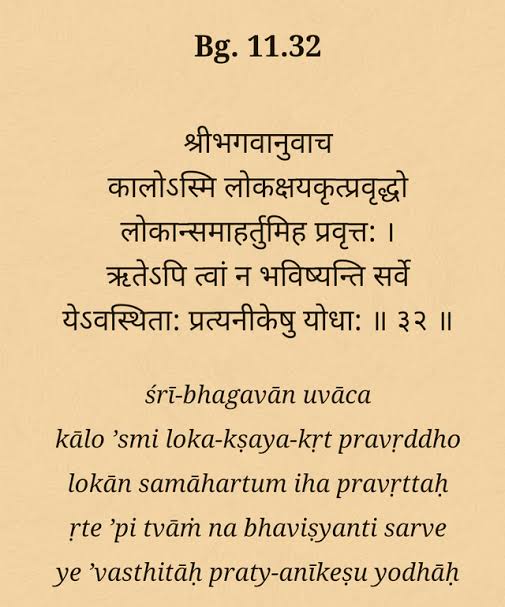
The shloka from Chapter 11, Verse 32 of the Bhagavad Gita, where Lord Krishna declares himself as time, the great destroyer of worlds, remains highly relevant in contemporary times, especially with regard to technological advancements, AI, and nuclear weapons.
In the modern era, we have witnessed unprecedented technological advancements that have transformed the world in various ways. While technology has brought immense progress and convenience, it has also raised concerns about its impact on society, the environment, and human well-being. The verse reminds us that time is a relentless force that shapes the destiny of civilizations and technologies. It calls for responsible and ethical use of technology to ensure the betterment of humanity and the preservation of our planet.
The rapid development of AI has the potential to revolutionize industries, create new possibilities, and address complex challenges. However, it also raises ethical questions and concerns about the impact of AI on employment, privacy, and decision-making. The shloka’s message of the inevitability of time and change serves as a reminder that while AI may reshape our world, human values, compassion, and wisdom must guide its implementation to avoid negative consequences.
The Bhagavad Gita’s shloka takes on profound significance in the context of nuclear weapons. These weapons have the power to cause catastrophic destruction on a global scale. The verse reminds us of the impermanence of material existence and serves as a cautionary message about the consequences of unbridled aggression and the importance of finding peaceful resolutions to conflicts.
In summary, the shloka’s core message of the transient nature of material existence, the significance of time, and the inevitability of change holds timeless relevance. It calls for a mindful and responsible approach towards technological advancements, AI, and the use of nuclear weapons. As we progress in the modern age, reflecting on these eternal principles can help us navigate the complexities of our world with wisdom, compassion, and a commitment to the well-being of all beings.
